- AIdeations
- Posts
- 🚀 AI's New Frontier: FCC Fights Robocalls, Meta's AI Leap & Amazon's AI Shopper!
🚀 AI's New Frontier: FCC Fights Robocalls, Meta's AI Leap & Amazon's AI Shopper!
Dive into today's AI world - FCC's bold move against AI robocalls, Meta's massive AI strategy, Amazon's Rufus, groundbreaking AI research, and more!


TL;DR 📌:
FCC's AI Challenge: Chairwoman Jessica Rosenworcel leads FCC's crackdown on AI voice-generated robocalls, proposing a landmark change under the TCPA to combat these deceptive calls.
Meta's AI Aspiration: Zuckerberg's ambitious plan for Meta includes a significant investment in AI, aiming to develop "general intelligence" and integrate advanced AI into its platforms.
Amazon's AI Helper - Rufus: Introducing Rufus, Amazon's latest AI-powered shopping assistant, designed to enhance customer experience with personalized advice and product insights.
Childlike AI Learns Language: A novel AI model mimics a child's language learning process from camera footage, offering new insights into AI's learning capabilities.
Salary Reveal in AI Startups: Top US and European AI startups, including OpenAI and Hugging Face, offer lucrative salaries, signaling the industry's growth.
Next-Gen AI Assistants: WIRED's test of a new AI assistant reveals a future where digital helpers like Siri and Alexa are significantly more powerful.
AI and Inappropriate Content: A shocking encounter with AI-generated content on YouTube sparks controversy and legal concerns.
The Rise of Chief AI Officers: Companies, including the Mayo Clinic, are recognizing the need for Chief AI Officers to lead AI integration in business.
AI Browsing with Arc: TechCrunch highlights Arc Browser's development of an AI agent that surfs the web for users, bypassing traditional search engines.
AI Research & Tools Spotlight: Discover 'Dolma,' a colossal open-source AI language model corpus, and today's top AI tools like Mockey, Nero, and GPT Guard.
Stay informed and ahead of the curve in this rapidly evolving AI landscape. Embrace the future, where AI not only enhances our daily lives but also shapes our understanding of the world. 🌐🤖
FCC Rings in a New Era: Cracking Down on AI Voice-Generated Robocalls

Ah, robocalls. They're like that uninvited party guest who not only crashes your Saturday night but also tries to sell you a timeshare or convince you you're speaking to your long-lost uncle who's suddenly developed a keen interest in your bank details. But it looks like the FCC, under the steely gaze of Chairwoman Jessica Rosenworcel, is about to show these robotic party poopers the door.
Here's the scoop: the FCC is rolling up its sleeves to tackle those pesky AI voice-generated robocalls. You know, the ones that sound eerily like your favorite celeb or even Aunt Mildred? Yep, those. They've been on the rise, morphing from mere nuisances into full-blown scams, tricking folks with misinformation and voice cloning wizardry.
Rosenworcel's not having any of it. She's proposing to label these AI-generated calls as "artificial" under the TCPA. That's the Telephone Consumer Protection Act for those who don't speak acronym. This move isn't just about slapping a new label on things; it's a game-changer. It means these robocalls could soon be as illegal as, say, driving a tank through a drive-thru (don't try it, trust me).
This isn't just talk. The FCC's been laying the groundwork for this since last November, asking all the right questions about how AI's playing the villain in the robocall saga. And the best part? They're also exploring how AI can turn hero, helping us spot these scam calls before they even hit our phones. Talk about a plot twist!
The TCPA is the FCC's big gun in the fight against robocallers. It's like that rule at the buffet that says you can't pile your plate higher than your head. The TCPA keeps telemarketers in check, ensuring they get your written "yes, please" before they bombard you with calls. The new ruling would bring AI-generated calls under this umbrella too.
And it's not just the FCC flexing its muscles here. Over half of the nation's State Attorneys General, led by Pennsylvania's Michelle Henry, are cheering from the sidelines, ready to pounce on these AI abusers. They've got a Memorandum of Understanding – essentially a fancy handshake agreement – with 48 State AGs to join forces against robocalls.
So, what's the real deal here? It's all about giving you back control over your phone. Imagine a world where your ringtone sings only for real people, not some AI-generated voice trying to con you. A world where you can answer a call without that niggling fear that it's a scam. That's the future the FCC's carving out with this move. And frankly, it's about time.
Remember the time when we used to get excited about unknown numbers? Maybe it's a long-lost friend, a surprise job offer, or, dare I say, a lottery win? Those days might be coming back, minus the lottery part (don't hold your breath on that one). But one thing's for sure: it's a step towards reclaiming our phones from the clutches of scammy robocalls. And that's a call we all want to answer.

Meta's Bold AI Strategy: Zuckerberg's Plan to Surpass Google and Microsoft with Advanced Data-Driven AI Initiatives

Quick Bytes: Mark Zuckerberg outlines Meta's strategy to outpace Google and Microsoft in AI, leveraging its vast data resources and aiming for "general intelligence."
Key Takeaways:
Data Advantage: Zuckerberg highlights Meta's access to billions of public images and videos, surpassing common web data sets used by competitors.
Ambitious Goals: Meta aims to develop "general intelligence" AI, capable of handling tasks more efficiently than humans.
Hefty Investment: Meta's capital expenditures could surge to $30-$37 billion this year, a significant increase from $28.1 billion in 2023.
Long-Term Commitment: The company prepares for sustained investment in AI infrastructure beyond 2023.
Incorporating AI in Products: Plans include integrating advanced AI in Meta platforms like Facebook, Instagram, and WhatsApp.
The Big Picture: Meta's aggressive pursuit of AI dominance, backed by its unparalleled data resources and commitment to significant investments, positions the company as a formidable contender in the AI race. Zuckerberg's vision extends beyond current offerings, aiming to integrate advanced AI capabilities across Meta's popular platforms, potentially reshaping user experiences and setting new industry standards.

Amazon Introduces 'Rufus' - A New AI-Powered Shopping Assistant for Enhanced Customer Experience

Image Credit: Geekwire
Key Takeaways:
AI-Driven Assistance: Rufus, trained on Amazon's extensive product catalog and web information, offers personalized shopping guidance.
Enhanced Product Insight: The chatbot provides detailed comparisons and advice on products, from running shoes to tech gadgets.
Contextual Suggestions: Rufus caters to specific needs, offering suggestions for activities like hiking or events such as holidays.
Product-Specific Queries: It can handle detailed questions about individual products, enhancing the decision-making process.
Continuous Improvement: Amazon emphasizes ongoing model refinement and encourages customer feedback for Rufus's evolution.
Gradual Rollout: Initially available to a limited customer base, Rufus will be expanded to more users in the coming weeks.
The Big Picture: Rufus represents a significant leap in AI-assisted e-commerce, offering a more intuitive, informed, and personalized shopping experience. This development showcases Amazon's commitment to integrating generative AI across its services, setting new standards in online retail customer engagement and satisfaction.

Groundbreaking Study: AI Model Mimics Child's Language Learning from Camera Footage
Quick Bytes: An innovative study has trained an AI to associate words with images, mirroring a child’s language acquisition, using only 61 hours of a toddler's life footage.
Key Takeaways:
Research Methodology: Researchers used footage from a camera worn by a child named Sam, aged 6-25 months, to train a basic AI model in word-image association.
Simplified Learning Process: The study, published in Science, suggests language learning might be less complex than previously thought, requiring no preprogrammed assumptions.
AI's Human-Like Learning: Despite being exposed to a fraction of human experiences, the AI successfully associated many words with corresponding images.
Implications for AI Development: The study challenges the need for massive data sets, like those used in models such as GPT-4, for effective AI learning.
Limitations and Future Research: The focus was on nouns for physical objects; understanding human language's full complexity, including verbs and abstract concepts, remains a challenge.
The Big Picture: This research offers a glimpse into the potential of AI to learn and interpret language in a manner similar to human children. It opens new possibilities for understanding cognitive development and enhancing AI’s learning efficiency, impacting future AI applications and our understanding of human language acquisition.


How to Turn ChatGPT into an Unstoppable Virtual Employee Army


Authors: Luca Soldaini, Rodney Kinney, Akshita Bhagia, Dustin Schwenk, and others from the Allen Institute for AI, University of California Berkeley, Carnegie Mellon University, Spiffy AI, Massachusetts Institute of Technology, University of Washington.
Executive Summary:
The research paper introduces "Dolma," a comprehensive open-source corpus consisting of three trillion tokens. It's designed to aid research in language model pretraining, offering a diverse mixture of data sources including web content, scientific papers, code, books, social media, and encyclopedic materials. The authors also provide a data curation toolkit for further experimentation and reproducibility. Dolma addresses the lack of transparency in training data of commercial language models and aims to facilitate open research. The paper documents Dolma's design principles, construction details, content summary, and its use in training the OLMo language model.
Pros:
Unprecedented Scale: With three trillion tokens, Dolma is one of the largest and most diverse datasets available for language model research.
Openness and Transparency: Provides open access to pretraining data and tools, promoting research inclusivity and reproducibility.
Comprehensive Data Sources: Incorporates a wide range of text sources, ensuring a diverse and representative dataset.
Practical Toolkit: The accompanying toolkit enables researchers to efficiently curate and process large datasets.
Limitations:
English-Only: Dolma is currently limited to English text, which may restrict its applicability for multilingual model training.
Potential for Bias: Despite efforts to filter toxic content and personal data, biases inherent in source materials could still be present.
Use Cases:
Language Model Pretraining: Ideal for researchers developing and studying language models.
Data Curation Research: Provides insights into effective data curation practices.
Educational Purposes: Useful in academic settings for teaching and research on language models.
Why You Should Care:
Dolma's release is a significant step towards democratizing language model research. It offers an open, extensive dataset that facilitates understanding the impact of training data on model performance. This transparency is crucial for advancing language model technology in an ethical and inclusive manner. Researchers, educators, and developers can leverage Dolma to drive innovation and exploration in natural language processing.


Mockey - Free product mockup generator with 1000+ templates. Premium & free Mockup generator for your next big idea.
Nero - Enhance videos to 2x or 4x their original quality. Remove noise and grain, ensuring your videos are crystal clear.
GPT Guard - Keep your ChatGPT Conversations Secure and Private. Unlock and freely use your data for AI and data analytics while safeguarding security and meeting privacy regulations.
OneCliq - Meet your very own AI content assistant. Personalized and data driven Insights to grow your online presence.
Dripify - Multifunctional LinkedIn automation tool designed to help your sales team improve LinkedIn prospecting and close more deals — all on complete autopilot
Faltah - Practice interview questions, enhance your skills, and give you tips for your next interview.

Keyword Researcher
CONTEXT:
You are Keyword Researcher GPT, an SEO professional who helps [ENTER WHAT YOU DO] get more traffic from Google. You are a world-class expert in keyword research.
GOAL:
I want you to complete keyword research for my business. I will use this information to drive more traffic to my blog. Return at least 30 keywords.
KEYWORD RESEARCH CRITERIA:
- Base your keyword research on the analysis of my target audience's problems, questions, goals, and objections
- Prioritize medium-tail and long-tail keywords to increase my chances of ranking
- Group keywords in the keywords groups. Don't return more than 7 keywords groups
- Prioritize keywords that are more likely to be popular with my audience but not very competitive with other blogs
- Don't add quotation marks to keywords.
INFORMATION ABOUT ME:
- My target audience: [ENTER TARGET AUDIENCE]
- My business: [ENTER YOUR BUSINESS INFO]
- My blog: [WHAT DO YOU WRITE ABOUT]
RESPONSE STRUCTURE:
Keyword group name 1
1) Medium-tail
- keyword
- keyword
- keyword
2) Long-tail
- keyword
- keyword
- keyword
FORMATTING:
Use Markdown to format your response.
A decade ago we would've thought a single-person-company had no chance of reaching a billion dollar valuation 💸
But now thanks to all this AI, it is. You heard it straight from @OpenAI CEO @sama ↓
— Alexis Ohanian 🇦🇲 (@alexisohanian)
6:00 PM • Jan 31, 2024



